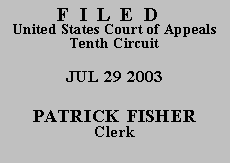

| UNITED STATES OF AMERICA,
v.
MARCELINO HERNANDEZ-MORALES |
No. 02-1521
(D.C. No. 02-CR-229-D) |
On appeal, Defendant reasserts the Apprendi challenge to his sentence. As did the district court, we reject that argument as squarely foreclosed by Circuit and Supreme Court precedent. As we stated in United States v. Martinez-Villalva, 232 F.3d 1329 (10th Cir. 2000),
[T]he fact of defendant's prior felony conviction is not an element of the offense with which he was charged by indictment, but is, instead, a sentencing factor. Consequently, the indictment in this case, which did not separately charge defendant with a prior aggravated felony conviction, did not violate defendant's constitutional rights.
Id. at 1332 (citing Apprendi, 530 U.S. at 48980, and Almendarez-Torres v. United States, 523 U.S. 224, 235 (1998)).
Accordingly, we AFFIRM Defendant's sentence.
ENTERED FOR THE COURT
David M. Ebel
Circuit Judge
*.After examining appellant's brief and the appellate record, this panel has determined unanimously that oral argument would not materially assist the determination of this appeal. See Fed. R. App. P. 34(a)(2) and 10th Cir. R. 34.1(G). The case is therefore ordered submitted without oral argument. This order and judgment is not binding precedent, except under the doctrines of law of the case, res judicata, and collateral estoppel. The court generally disfavors the citation of orders and judgments; nevertheless, an order and judgment may be cited under the terms and conditions of 10th Cir. R. 36.3.